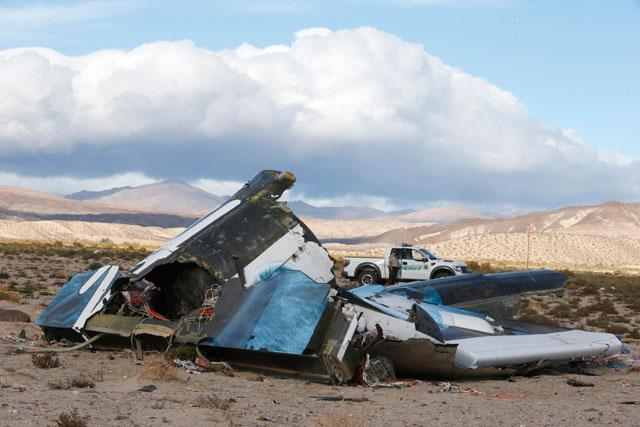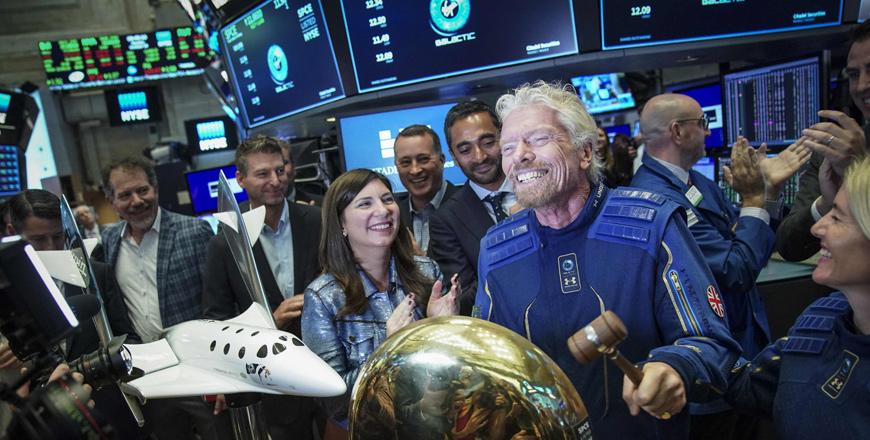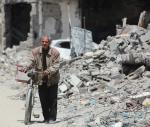You are here
Richard Branson says space dream lives on, vows safety paramount
By AFP - Nov 01,2014 - Last updated at Nov 01,2014

MOJAVE, United States — British tycoon Richard Branson insisted Saturday his dream of commercial space travel remained alive but warned his company would not "press on blindly" without knowing what caused the spacecraft crash that killed one pilot and seriously injured another.
Speaking to reporters after arriving in the California facility which had been the hub of Virgin Galactic's space programme, Branson said safety remained his paramount concern.
"We owe it to our test pilots to find out exactly what went wrong, and once we've found out what went wrong, if we can overcome it, we'll make absolutely certain that the dream lives on," Branson told reporters.
"We do understand the risks involved, and we're not going to push on blindly," he said. "To do so would be an insult to all those affected by this tragedy.
"Safety has always been our number one priority," he added before heading off to rally grieving Virgin Galactic staff.
Branson's comments at the Mojave Air and Space Port came as a team of federal investigators began probing the causes of Friday's accident, which dealt a devastating setback to the cause of commercial space tourism.
Unknown territory
National Transportation Safety Board (NTSB) acting chairman Christopher Hart told reporters investigators were entering unknown territory but hoped to find clues to the accident in data gathered by Virgin Galactic.
"This will be the first time we have been in the lead of a space launch that involved persons on board," Hart said.
It was not immediately known if a black box flight data recorder was installed on the doomed suborbital craft, Hart said.
However, "this was a test flight and test flights are typically very well documented in terms of data", he noted.
"We may have lots of evidence that will help us with the investigative process."
Branson headed to California within hours of Friday's crash, which saw the company's suborbital SpaceShipTwo break apart and hurtle to earth shortly after it had detached from a mothership at an altitude of around 13,700 metres during a test flight.
The crash was the second disaster to rock the private space industry in the space of a few days, after an Antares rocket carrying supplies to the International Space Station exploded after take-off in Virginia in Tuesday.
Space tourism grounded
Experts say the accident will delay the advent of commercial space tourism by several years.
Virgin Galactic had hoped to start ferrying wealthy customers to the edge of space in 2015, charging $250,000 per person for a ticket on the company's six-seater vehicle.
Around 500 people, including a slew of celebrities such as Hollywood star Leonardo DiCaprio, had already reserved tickets on the first wave of Virgin Galactic flights, according to reports.
Branson said Saturday anyone who wanted to cancel their reservation would be refunded.
"Of course, anybody who ever wants a refund would be able to get a refund," he said.
As investigators launched their probe, early attention had been focused on a new kind of fuel being used in Friday's flight, the 35th by SpaceShipTwo.
The plastic-based fuel had been tested on the ground before but not in flight.
But Branson hit back at early theories surrounding what may have caused the accident.
"To be honest, I find it slightly irresponsible that people who know nothing about what they're saying can be saying things before the NTSB makes their comments," he said.
Friday's accident was not the first tragedy to strike the Virgin Galactic programme.
In 2007, three people were killed after a rocket designed for use in SpaceShipTwo exploded during testing.
Witnesses to Friday's accident said there was no obvious sign of an explosion from the ground.
"If there was a huge explosion, I didn't see it," said Mojave Air and Space Port chief Stu Witt. "From my eyes and my ears, I detected nothing that appeared abnormal."
Private companies are rushing to fill the gap left by NASA, which ended its 30-year shuttle programme in July 2011 with a final Atlantis mission to the International Space Station (ISS).
Analysts said the latest accident is a huge blow to the nascent industry.
"You are not going to see any commercial space tourism flight next year or probably several years after that," said Marco Caceres, an analyst and director of space studies for the Teal Group, a defence and aerospace consultancy.
Related Articles
NEW YORK — Virgin Galactic skyrocketed on Wall Street on Friday after US officials approved the first commercial licence to take consumers t
Fiery failures are no stranger to the space game. It’s what happens when you push the boundaries of what technology can do, where people can go. And it happened again to Virgin Galactic’s SpaceShipTwo.
LONDON — As famous for his thrill-seeking lifestyle and publicity stunts as for his vast business empire, Richard Branson has set his sights

















